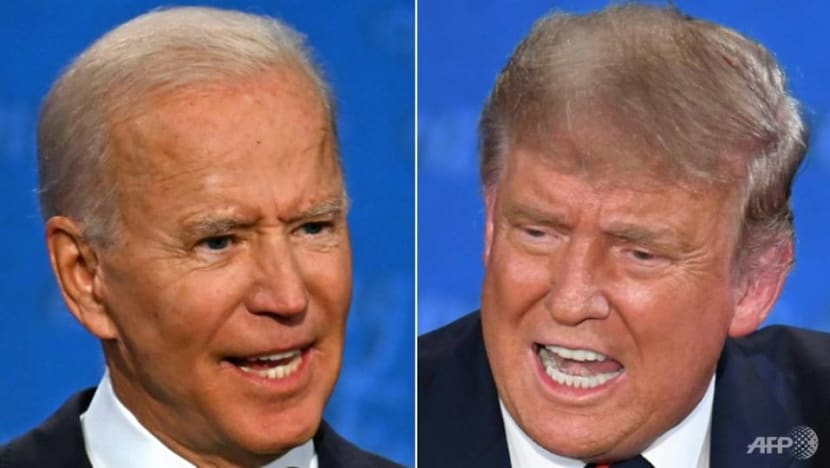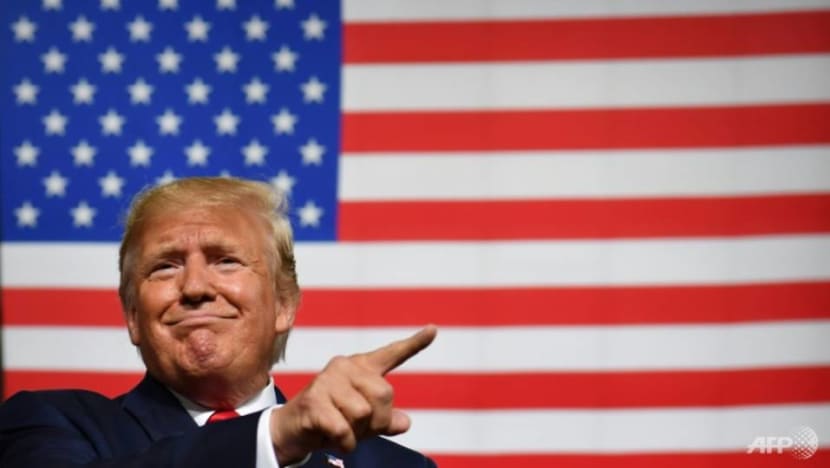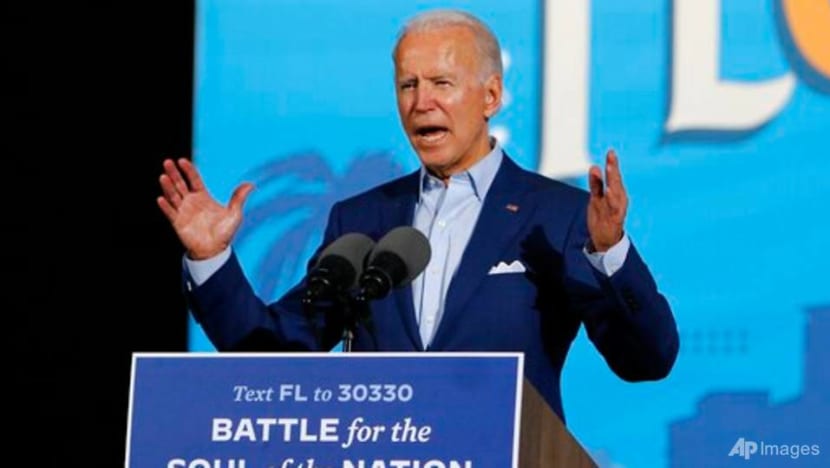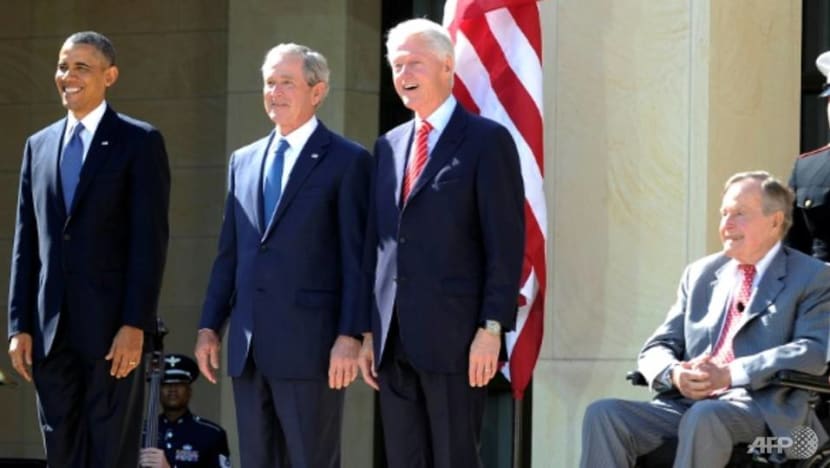commentary Commentary
Commentary: Two visions collide, as US head to historic polls this week
While the choice between Donald J Trump and Joe Biden is a stark one, the future that lies ahead for the Unites States is not set in stone, even if there is a clear presidential election win, say BowerGroupAsia’s James Carouso and Dr Prashanth Parameswaran.

Joe Biden and Donald Trump. (Photo: AFP/JIM WATSON, SAUL LOEB)
SINGAPORE: This is a historically important election. Even as Americans head to the polls to end the long and arduous 2020 US election season, uncertainty hangs over the outcome and the aftermath.
While that uncertainty is understandable given the surprising victory of incumbent US President Donald Trump in 2016, the stakes are arguably higher this year, and the implications both at home and abroad will be significant whichever candidate wins this time around.
While the COVID-19 pandemic has devastated US lives and livelihoods, much of the rest of the world is wondering whether the disruptive force of Trump’s America First agenda that has cast doubt about the traditional US role in the world will endure until 2024 and beyond.
The expectation is that Biden would return the United States to its traditional role as guarantor of the current international order, including the importance of multilateral institutions and agreements.
READ: Win the vote but still lose? Behold the US Electoral College
READ: Commentary: Biden races to the White House finish line. What does this mean for America?
INTENSE POLARISATION, CAUTIOUS PREDICTIONS
Those high stakes internationally are indicative of the domestic dynamics we are witnessing heading into the elections.
Polarisation has led to both camps casting doomsday scenarios if the other triumphs: Biden critics argue he will push the country toward socialism, while Trump detractors say his re-election would embolden him and send the country further down the path of greater inequality and poor governance.
Participation is set for record levels for a US election. Heading into Election Day, turnout figures from the US Elections Project, which tracks early voting, show the country is on track for historic figures even in the midst of a pandemic.

This includes high participation from youth and minorities relative to the 2016 election. One young voter is quoted as saying:
I didn’t want to be the one political person talking about sensitive topics (in 2016 … Now it seems like everybody talks about it, and everybody is willing to share what they believe.
Predictions have also been much more cautious.
Though polls have consistently showed Biden having a significant advantage over Trump in the popular vote since the former vice-president snared the Democratic nomination, there is deep reluctance to trust the numbers given that Trump defied the pollsters in 2016.
This time there is more discussion on what the winner’s path to victory might look like.
A TRUMP WIN: A MORE PROTECTIONIST, NARROWLY SELF-INTERESTED US
Whatever the outcome, Trump and Biden offer radically different paths for the US.
If Trump wins, insiders say he would be emboldened to further reshape the country in his image, including restaffing key institutions and advancing aspects of what critics label a protectionist, nativist, and narrowly self-interested vision of the country.
READ: Commentary: Are we giving Trump less credit than he deserves?
READ: Commentary: Facebook’s safeguards for the US election are the right move
This does not mean there will be no room for collaboration across party lines, especially on issues such as infrastructure which Trump and Biden both prioritised in their party platforms.
But consensus would typically be much more difficult to strike, especially given an even more emboldened Trump and the expected reckoning within the Democratic Party in the face of two straight losses.
Abroad, the struggle between the traditional tenets of US foreign policy and Trump’s America First agenda can be expected to continue, especially on trade policy and the US approach to its allies and adversaries.
READ: Commentary: US President in 2020 - why Donald Trump could win again

To be sure, there may be more continuity in Asia relative to other regions given the broad bipartisanship that exists on key issues, including a tougher approach towards China.
READ: Commentary: After a stormy few years, verdict on Trump’s trade war with China is clear
READ: Commentary: Who would Beijing prefer wins the US presidential election in November?
But Trump’s fingerprints will remain on the tenets of the US Indo-Pacific approach, be it on tariffs or lack of attendance at multilateral fora conducted by the Association of Southeast Asian Nations (ASEAN).
A BIDEN WIN: AN OVERWHELMED AND DISTRACTED US
A Biden victory would set the US on a starkly different path.
At home, beyond taking a more zealous approach to tackling the pandemic, Biden’s Build Back Better agenda will likely mean higher taxes on wealthier individuals (those earning more than US$400,00 a year) more government involvement in healthcare, and a more open approach to legal immigration.
But the question will be a Biden administration’s ability to forge that path clearly as it focuses on stemming the pandemic and jumpstarting economic recovery.

One tension will be how Biden and his team will sort out struggles between the Democratic Party’s moderate camp and the more progressive wing on ranking agenda items like healthcare and climate change and resourcing other priorities such as defence.
On foreign policy, Biden would enter the White House with decades of experience from the Senate and as vice-president that Trump sorely lacked, and Democratic insiders note he will have a much deeper bench of advisers to draw from.
But the question of prioritisation and balance will remain, especially when it comes to emphasis on democracy and human rights, which Democrats feel were undermined under Trump. Much will depend on which party controls the Senate, which could effectively bottle up Biden initiatives.
Asia will continue to be top of mind, given both its own strategic weight and US interests in the region which have grown in importance with China’s increasing clout.
READ: Commentary: Corporate America is breaking up with Donald Trump
READ: Commentary: Looks like China has its own '+1' strategy and Southeast Asia is it
But with the focus on domestic economic recovery and resetting many of Trump’s policies – from climate change to Iran – a Biden administration could also easily become overwhelmed and distracted, which could mean less attention for the smaller countries in regions like South and Southeast Asia.
KEY QUESTIONS REMAIN REGARDLESS OF WHO WINS
Trump and Biden offer starkly different visions for how the US will be governed, and history does not necessarily provide a useful guide.
If Trump wins, distinctions between the two terms of the George W Bush and Barack Obama administrations are important reminders that one should not expect total continuity across a president’s two terms in office, which can have important implications for Asia policy.

George W Bush’s second term saw the US try to temper some of the unilateralist, threat-driven impulses seen in the first term following the Sep 11, 2001 attacks and the war on Iraq, which had implications for US Asia policy with the appointment of the first ever US ambassador to ASEAN and Washington’s initial foray into the original Pacific Four agreement between Brunei, Chile, New Zealand, and Singapore which eventually became the Trans-Pacific Partnership (TPP).
Meanwhile, under Obama’s second term, though progress continued to be made on other foreign policy issues such as engaging Iran and Cuba as well as a climate change deal in Paris, some of the shine regarding the pivot to the Asia-Pacific came off owing to developments including failure to pass the TPP as well as Beijing’s continued flouting of the rule of law in the South China Sea.
And if Biden wins, the experience of veteran foreign policy hands such as those that worked for George HW Bush is a reminder that experience and policy gains in some areas do not necessarily always translate into a successful overall presidency.
READ: Commentary: Trump will get beaten by Biden by millions of votes but plans to win anyway
READ: US early voting surges as Trump, Biden make late push
After all, although under Bush, the Cold War ended, Germany was united and he built and managed the coalition that expelled Iraq from Kuwait, these significant foreign policy achievements were insufficient for him to win a second term. As Bill Clinton, the winner over Bush of the 1992 election knew; the election hinged on economic issues.
Regardless of who wins, it is worth noting that many of the questions foreign observers have about the US will likely not go away quickly. Trump’s re-election will only increase the scrutiny on the disjuncture between elite and popular opinion in the US, especially given the expected stability of predictions about a Biden victory even with mail-in ballots.
And a Biden victory will not prevent ardent skeptics from waiting for 2024 to see whether the US is truly back to continuity on foreign policy or whether a more disruptive figure such as Trump could emerge again from either party.
That is not to understate the importance of the outcome of the Nov 3 elections, even if it takes some days or weeks to be definitively known.
There is a significant risk of political stasis, or worse, if the election is close and the results require litigation.
Given the stakes as well as the starkly different worldviews and strategies of the candidates, whoever wins could play a critical role in reshaping the US at home and abroad for years and even decades to come.
James Carouso, a former US diplomat, is Managing Director of BowerGroupAsia, Singapore.
Dr Prashanth Parameswaran is a Director with BowerGroupAsia, US and a widely recognised expert on Asian affairs and US policy in the region.
















